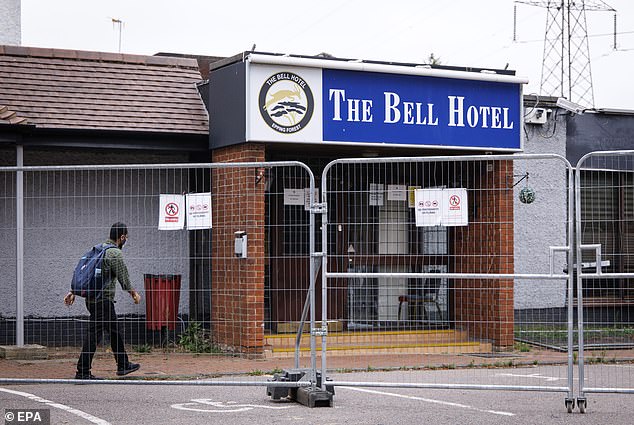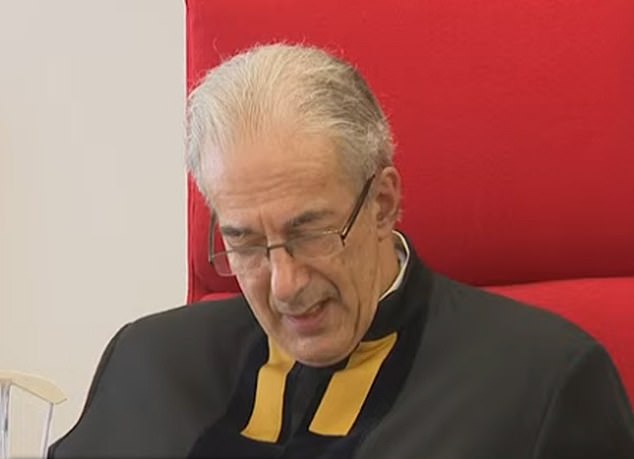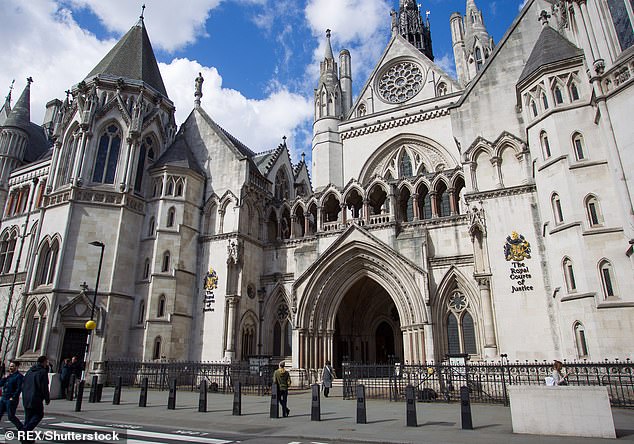A hotel at the centre of anti-immigration protests will be able to continue housing asylum seekers after judges overturned a decision that would have seen it close within a fortnight.
In a major hearing today, the Court of Appeal set aside an injunction granted earlier this month which would have stopped 138 asylum seekers from being housed at the Bell Hotel in Epping, Essex beyond September 12.
The judges also ruled that the Home Office could intervene in the case, in a significant victory for the Government.
Lawyers for Home Secretary Yvette Cooper had argued that shutting the hotel would set a ‘dangerous precedent’ that would have encouraged similar litigation by other councils.
Last week, the High Court ruled that all 138 asylum seekers at the hotel should be temporarily removed following legal action brought by Epping Forest District Council.
Yesterday the Home Office and owners of The Bell asked the Court of Appeal to reconsider the judgment.
Quashing the injunction, Lord Justice Bean, sitting with Lady Justice Nicola Davies and Lord Justice Cobb, said Mr Justice Eyre – who granted the interim injunction last week – ‘made a number of errors in principle, which undermine this decision’.
‘We grant permission to appeal, both to Somani and to (the Home Office)… We allow the appeals and we set aside the injunction imposed on 19 August 2025.’
The judges also ruled that the Home Office could intervene in the case, saying that Mr Justice Eyre made an ‘erroneous’ decision not to let the department be involved.
Reading a summary of their decision, Lord Justice Bean said the Home Office had a ‘constitutional role relating to public safety’ and was affected by the issues.

The Home Office and Somani Hotels, which owns the Bell Hotel in Epping, Essex, today successfully overturned a High Court ruling ordering them to remove all 138 residents

There were fresh protests outside the Bell Hotel in Epping last night prior to today’s ruling

Quashing the injunction, Lord Justice Bean said Mr Justice Eyre – who granted the interim injunction last week – ‘made a number of errors in principle, which undermine this decision’
He continued: ‘The judge’s approach ignores the obvious consequence that the closure of one site means capacity needs to be identified elsewhere in the system.’
He added that such an injunction ‘may incentivise’ other councils to take similar steps as EFDC.
He said: ‘The potential cumulative impact of such ad-hoc applications was a material consideration… that was not considered by the judge.’
The judge also said that the appeals were ‘not concerned with the merits of government policy in relation to the provision of accommodation for asylum seekers in hotels or otherwise’.
Touching on local residents’ fear of crime, Lord Justice Bean said: ‘The Epping residents’ fear of crime was properly taken into account by the judge as a factor in favour of grant of an injunction. He described it as being of limited weight.’
He added: ‘We agree it is relevant, but in our view, it is clearly outweighed… by the undesirability of incentivising protests, by the desirability in the interests of justice of preserving status quo for the relatively brief period leading up to the forthcoming trial and by the range of public interest factors which we have discussed in our judgment.’
The full written judgment in the case, which Lord Justice Bean said runs to over 120 paragraphs, will be provided later.
Tory leader Kemi Badenoch urged Conservative councillors seeking similar injunctions to ‘KEEP GOING!’ despite the ruling.
In a statement, Mrs Badenoch said: ‘Local communities should not pay the price for Labour’s total failure on illegal immigration.
‘Keir Starmer has shown that he puts the rights of illegal immigrants above the rights of British people who just want to feel safe in their towns and communities.
‘This ruling is a setback, but it is not the end. I say to Conservative councils seeking similar injunctions against asylum hotels – KEEP GOING!
‘Every case has different circumstances, and I know good Conservative councils will keep fighting for residents, so we will keep working with them every step of the way.’
She said the party will be writing to all Tory councillors with further advice following the judgment.
She added: ‘Labour have run out of options, so the only answer left is to dump the problem on local communities.’
Shadow Justice Secretary Robert Jenrick called the ruling ‘extremely disappointing’ and urged councils to still take action to close asylum hotels in their areas.
‘The Government’s lawyers argued accommodating illegal migrants was in the ‘national interest’. In court they said the right of illegal migrants to free hotels is more important than the rights of the British people,’ he said.
‘Well, they are not. The British Government should always put the interests of the British people first. Starmer’s Government has shown itself to be on the side of illegal migrants who have broken into our county. But this is not a free pass for asylum hotels.’
Speaking before the verdict, Health minister Stephen Kinnock claimed a wave of hotel closures sparked by the original High Court ruling could have led to many of their residents becoming homeless.
‘It’s not a question of if we close the hotels, it’s a question of when and how we close the hotels, and what we don’t want to have is a disorderly discharge from every hotel in the country, which would actually have far worse consequences than what we currently have, in terms of the impact that would have on asylum seekers potentially living destitute in the streets,’ he told Sky News.
‘And I don’t think any one of the communities that are campaigning on these hotels issue want to see that.
‘So what we are doing is looking to appeal this injunction simply because we’re taking a pragmatic approach to how we want to manage the process, not because we believe that the hotel … per se should stay open.’

Today’s decision was made by the Court of Appeal (pictured)

Protesters march towards The Bell Hotel this evening, waving England flags and Union Jacks
The Home Office had also appealed against Mr Justice Eyre’s decision last week not to let it intervene in the case, with this challenge also allowed by the Court of Appeal.
The Bell became the focal point of several protests and counter-protests in recent weeks after an asylum seeker housed there was charged with sexually assaulting a teenage girl last month.
Hadush Gerberslasie Kebatu has denied the offence and has been on trial this week.
Edward Brown KC, for the Home Office, said that the interim injunction ‘runs the risk of acting as an impetus for further protests, some of which may be disorderly, around other asylum accommodation’.
Health minister Stephen Kinnock also warned earlier on Friday that asylum seekers could be ‘living destitute in the streets’ if there was a ‘disorderly discharge’ from hotels.
Piers Riley-Smith, for Somani Hotels, said in written submissions on Thursday that Mr Justice Eyre ‘overlooked’ the ‘hardship’ that would be caused to asylum seekers if they were required to move.
He continued that the ‘extremely high-profile nature of the issue’ created a ‘risk of a precedent being set’.
The hotel first housed asylum seekers from May 2020 to March 2021.
It accommodated single adult males from October 2022 to April 2024, and has done so again since April this year.

Home Secretary Yvette Cooper had appealed against the High Court ruling ordering the Bell Hotel to be closed
The council never previously took enforcement action, with its barristers telling the Court of Appeal that its previous use as asylum seeker accommodation had been ‘unproblematic’.
Opposing the appeal bids, barrister Philip Coppel KC stated in written submissions that the case ‘sets no precedent’ and there was ‘no compelling reason’ for the injunction to be overturned.
He continued: ‘There was no error of law in the judge’s approach, and his decision, based on a carefully calibrated assessment of the relevant factors, was open to him.
‘Notwithstanding the public controversy surrounding the judge’s decision, it was based on the conventional application of well-settled and agreed principles of law.’
Reform UK leader Nigel Farage previously hailed the High Court decision as a ‘victory’ and said he hoped it ‘provides inspiration to others across the country’.
He also indicated that the 12 councils where Reform UK was the largest party would consider legal challenges.
The latest Home Office data, published last week as part of the usual quarterly immigration statistics, shows there were 32,059 asylum seekers in UK hotels by the end of June.
This was up from 29,585 at the same point a year earlier, when the Conservatives were still in power, but down slightly on the 32,345 figure at the end of March.
Following the Court of Appeal’s ruling, Lisa Foster of Richard Buxton Solicitors, which represents Somani Hotels, said: ‘We are pleased that the Court of Appeal has ruled that the injunction should not have been granted by the High Court.
‘Our clients realise that they have been caught in the middle of a much wider debate on the treatment of asylum seekers and respectfully ask that members of the public understand that the Bell Hotel has simply been providing a contracted service that the Government requires.
‘We now ask that all associated with the Bell Hotel are left alone to continue to support the Government’s asylum plans as best they can.
‘We are grateful to the Court of Appeal for appreciating the urgency of the matter from everyone’s point of view and dealing with the matter so swiftly.
‘We have no further comment and will not be commenting on the matter again.’












